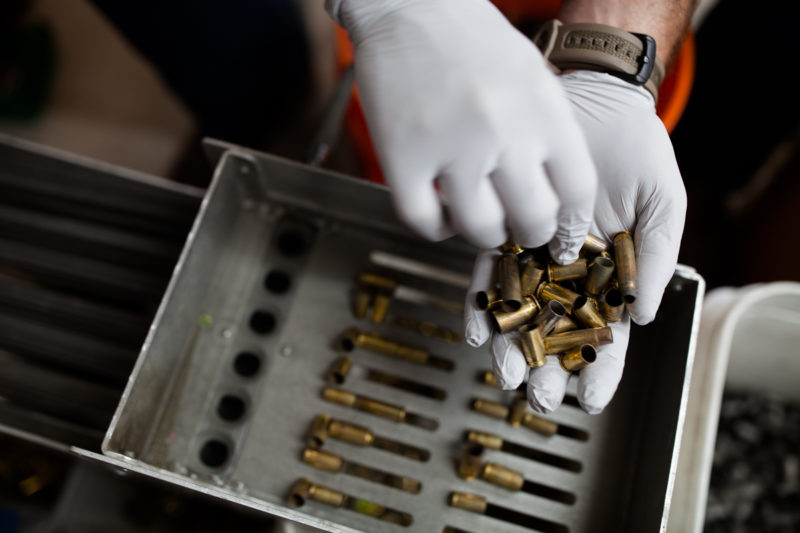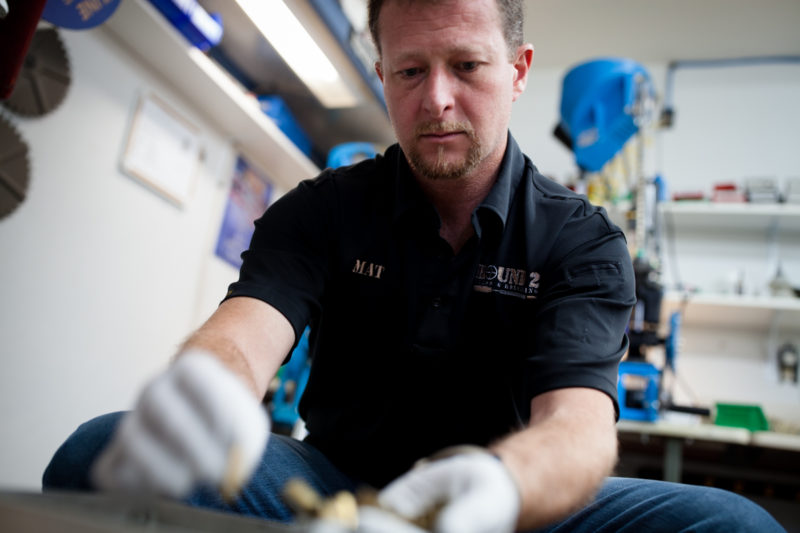In Central Texas, Reloading Ammunition Is More Than a Hobby
By Kaulie Lewis
Photography By Austin Price
Reporting Texas

Matt Unruh, the owner of Round 2 Brass and Reloading, sorts through fired ammunition to be reloaded or remanufactured in his garage shop in Leander. Austin Price/Reporting Texas
When Anthony Mowry inherited a single-stage ammunition press from a girlfriend’s grandfather, all he saw was a way to save a little money reloading his own used ammunition.
“Shooting is really expensive when you’re in college and you’re broke,” Mowry now says, almost 10 years later. “So we started playing with this press,” seeing whether it would be possible to make enough 9mm ammunition to offset some of the costs.
It quickly became evident this wasn’t going to work; the press was old, small and fitted with components that weren’t suited for the project Mowry was undertaking with his dad. So they bought another machine. Then they bought another. Now they run Parabellum Research, a reloading operation based in Kyle, which supplies “remanned” ammunition to eight ranges and sells to private customers.
While reloading ammunition is primarily a hobbyist’s activity, a number of small companies in Central Texas have made the jump to remanufacturing ammo for retail sales. Like Parabellum, many got their start in the late 2000s, when the ammunition industry was thriving in part due to the perception that the Obama administration would make it harder to own guns.
Now a sharp shift in the federal government’s attitudes towards the firearm industry — President Donald Trump campaigned as a supporter of the NRA and repeatedly has said he supports “Second Amendment rights” — has caused gun sales to dip as consumers feel less urgency. Though overall firearm sales numbers aren’t publicly available, FBI background checks, a commonly accepted replacement measure, have dropped by about 20 percent in the months since Trump’s election, as have the share values of several major arms companies.
But that hasn’t stopped Central Texas’s remanufacturing companies from turning a profit.
“We’re booming,” says Matt Unruh, the owner of Round 2 Brass and Reloading in Leander. “We’ve taken something from a hobby to a successful, growing — really growing faster than I want it to right now — business.”

Matt Unruh began remanufacturing ammunition as a hobby, but it’s grown into a “booming” business, he says. Austin Price/Reporting Texas
An estimated 10 billion rounds of ammunition are manufactured in the U.S. every year, but only a tiny fraction are “remanufactured,” or made with recycled brass casings. While the process of reloading those casings with fresh primers, gunpowder and bullets long has been a part of firearm culture, it was mostly done for personal use. Some reloaders simply wanted cheaper ammo; many treated it as a craft, customizing ammunition to suit their needs and interests.
A growing number of small companies has turned ammunition remanufacturing into a profitable business, filling niches left by larger ammo manufacturers. The process of turning used casings into like-new ammunition is labor intensive, requiring hours of sorting, cleaning and resizing. But if done on a large enough scale, it can be very cost-effective, allowing companies to offer products at a lower price point.
Unruh says a box of reloaded 9mm ammunition would cost $11.50, compared to $13 for new.
“When I started this business, my goal, my motto was to produce quality, dependable product at a price that kept people shooting. Because if people can’t afford to do it, they won’t. And if nobody’s [shooting], the industry goes away.”
“I wanted to keep the industry going,” he continues, “not just from a money standpoint but from a patriotic standpoint. I don’t want to see this go away. At a far extreme, I don’t want to see our rights taken away.”
Like many remanufacturing companies, Round 2 opened about 10 years ago, although Unruh didn’t make the business his full-time focus until 2012. At first, “I reloaded for my own shooting and to keep me at the range,” he says. Then friends began asking for a little ammo, then a little more.
“It got the point where, one, it was like ‘this could be a business,’ and two, I need to be licensed because I’m starting to load for a lot of people and I don’t want to go to jail,” Unruh remembers.
The license Unruh needed was a Federal Firearms License 6, required to legally manufacture ammunition for firearms.
“Everybody who loads has an FFL,” Mowry says, and the FFL 6 “is actually the easiest to get in the sense of you can’t buy guns, you can’t sell guns, you can’t transfer guns, you can’t do anything” without seeking further licensing.
Aside from the FFL and local business oversight, the ammunition remanufacturing industry is largely unregulated, unless you count the suspicion of many firearms enthusiasts. Reloaded ammo has a checkered history, with many hobbyists ruining guns or causing accidents trying to fire poorly made and dangerous products. Even though reloaded product is cheaper than new ammunition, some firearms enthusiasts keep their distance.
“There’s a stigma around a lot of it,” Unruh says. That’s why he and many other manufacturers push the “remanufacturing” label.
“This is a company, there’s quality control in place with a lot of procedures and checks before any ammo even goes out the door,” he says. “It’s not just me sitting in a spare room saying I’m going to press out some rounds.”
In fact, reloading high quality ammunition requires a breadth and depth of knowledge beyond anything casual hobbyists usually would achieve. Walking through the Parabellum Research shop in Kyle, Mowry rattles off a long litany of considerations that go into manufacturing ammunition. There’s the amount and type of powder to include, and calculations to increase speed and accuracy.
“It’s a lot of learning, a lot of reading, a lot of trial and error,” Mowry says. “It’s like everyone who opened breweries but didn’t know the first thing about yeast culture, the first thing about the fatty acid content of the grain. There’s all these things that you need to have a background in. So us shooting helped, but more so being interested in the knowledgeable portions of it and accepting learning.”
Though the remanufactured ammunition industry is only lightly regulated, a bill currently in the Texas House could reduce the oversight even more. House Bill 131 exempts firearms and ammunition made and sold in Texas from federal regulation, and it’s drawing criticism from gun violence prevention groups across the state.
“It’s unnecessary,” says Andrea Brauer, the executive director of Texas Gun Sense, a nonprofit organization that advocates for “common sense” gun violence prevention policies. “There’s no reason to undo federal oversight.”
Still, the presence of the remanufactured industry is largely unconcerning to Brauer. “I work on the policy that we can change in Texas, and that is not oversight of ammunition,” she says.
In order to change Texas gun policy at all, Brauer emphasizes the need to work with the firearms industry and the people who love it.
“We’re in Texas,” she says. “We can’t make progress without gun owners. And I think actually a lot of people are in the middle, they respect that Second Amendment but they want some regulation.”
That’s a stance Unruh can agree with. “I think we should have some oversight in some areas,” he says. “I don’t ever want to see innocent people be victimized or get hurt, and I think there’s ways that our legislators could make that happen without actually infringing on my rights.”
Meantime, Unruh, Mowry and others are happy to continue working in the ammunition industry, and they say Central Texas is the best location possible for their work.
“There’s probably not a greater area in the country to be in the firearms industry than Central Texas,” Unruh says. “It’s a hotbed for this industry.”